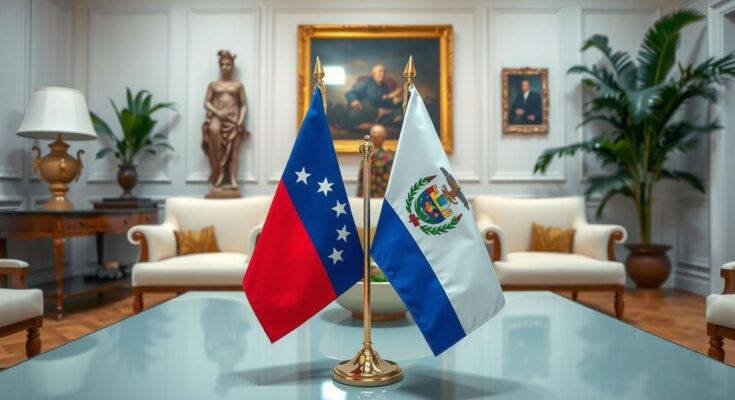César Trompiz, Venezuelan Ambassador to Bolivia, engaged with a North American delegation in February, addressing issues around the communes’ development, U.S. sanctions, and international relations. He emphasized the need for self-sustainability within Venezuela, criticized the confusion surrounding the recent elections, and affirmed strong ties with Bolivia and China. The discussion also clarified the realities of Venezuelan emigration and military threats posed by U.S. policies.
In a recent gathering organized by the Alliance for Global Justice, César Trompiz, the Venezuelan Ambassador to Bolivia, engaged with a North American delegation at the Plaza Hugo Chávez. The ambassador opted for an informal round of questions and answers, allowing participants to address their inquiries without a predetermined agenda. The discussion lasted nearly two hours on February 10, providing valuable insights into Venezuela’s current socio-political climate.
Ambassador Trompiz, who has a background in governmental relations, articulated the evolving state of Venezuela’s communes. Initially flourishing due to oil revenue, the communes faced setbacks amid economic challenges. Despite this, he noted a significant shift towards self-sustainability, with increased state support for agriculture and fishing. Currently, he emphasized that Venezuela is producing 90% of its food needs, demonstrating substantial improvement in local farming conditions.
On the subject of international relations, Ambassador Trompiz expressed disappointment regarding criticisms from figures such as Lula of Brazil and Gustavo Petro of Colombia concerning Venezuela’s recent elections. He critiqued their lack of understanding and support, suggesting that these leaders have grown distant amid changing political alliances. Furthermore, he affirmed the ongoing solidarity between Venezuela and the Bolivian government while acknowledging the value of bilateral investment, particularly in oil.
Regarding U.S. policy towards Venezuela, Ambassador Trompiz condemned the sanctions imposed by the U.S., describing them as aggressive acts that have resulted in grave humanitarian consequences. He highlighted the military threats posed by the U.S. and characterized the situation as a “soft war,” asserting that Venezuela has fortified its defenses against external aggression. The ambassador conveyed a strong message about self-defense and resilience, referencing historical statements by Hugo Chávez regarding the consequences of U.S. intervention.
Concerning Venezuela’s relations with China, Ambassador Trompiz emphasized that China’s approach is devoid of interference in Venezuela’s internal affairs. He described their relationship as strictly business-oriented, which allows Venezuela to navigate its foreign policy and maintain autonomy amid complex international pressures. He affirmed that Venezuela is not beholden to Chinese economic strategies.
Ambassador Trompiz addressed the implication of Venezuelan emigration, clarifying that the figure is not seven million but approximately two million, with many returning home. He emphasized the government’s efforts to repatriate nationals and counteract the effects of sanctions that have hampered economic recovery. The recent hostile actions toward Venezuelan entities in the U.S. were also condemned, highlighting the continued tensions between the two nations.
The conversation concluded with reflections on the broader geopolitical landscape and the impact of U.S. national policies on Latin American countries, particularly concerning labor and migration. The ambassador stressed the interconnectedness of these issues and the potential consequences for the U.S. as it navigates its foreign relations.
The dialogue with Ambassador César Trompiz provided essential insights into Venezuela’s evolving political landscape and external relations. The ambassador underscored Venezuela’s focus on self-sustainability amidst severe sanctions and international scrutiny. Furthermore, he addressed the complexities of regional politics involving progressive leaders and the ongoing impact of U.S. policies on immigration and military threats. Ultimately, the session shed light on Venezuela’s resilience and its strategic partnerships, particularly with countries like China and Bolivia.
Original Source: peoplesworld.org




